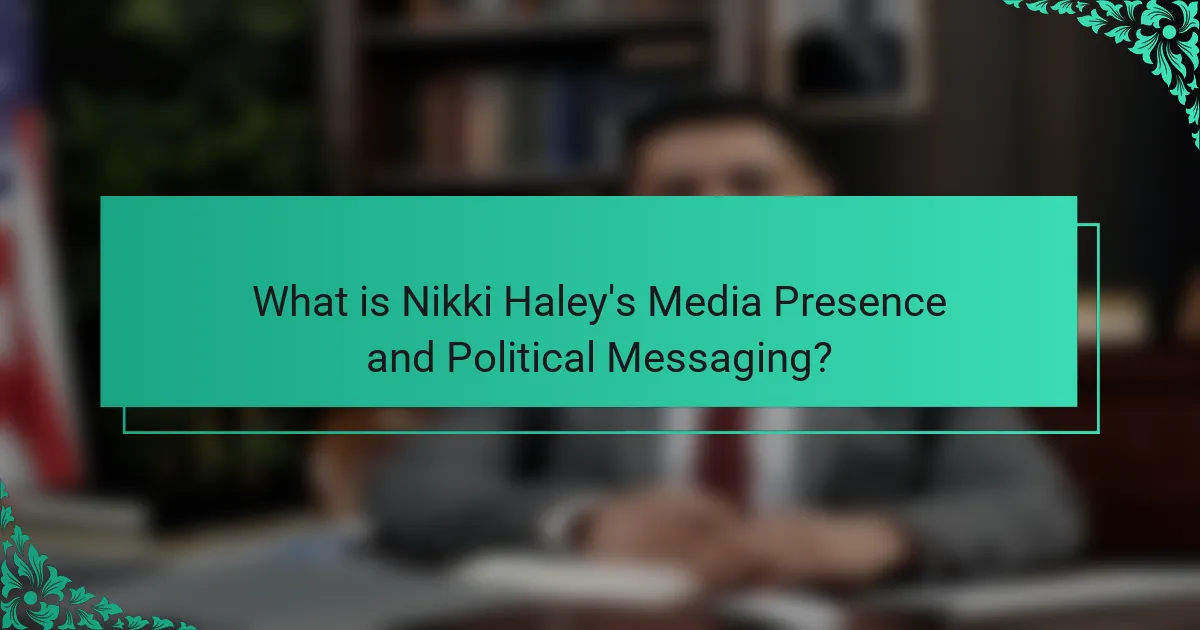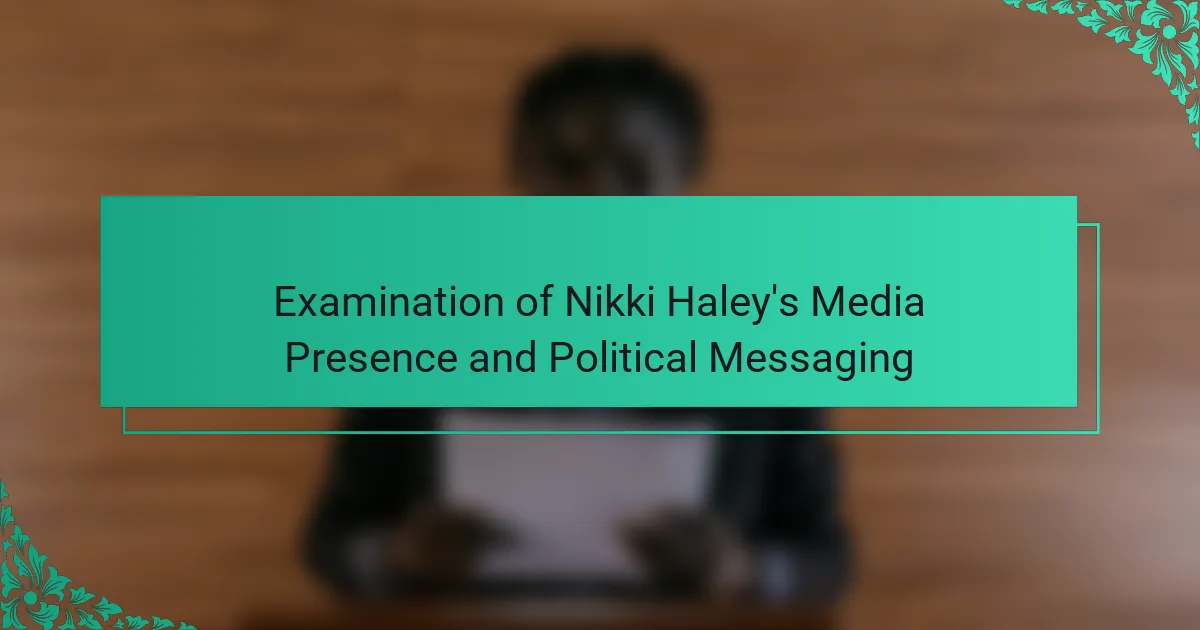Nikki Haley is a prominent political figure known for her active media presence and strategic messaging. This article examines her engagement across various platforms, including social media, television, and public speaking, highlighting her focus on leadership, national security, and economic growth. It explores how Haley connects with constituents through personal storytelling and articulates her views on key issues, while also emphasizing bipartisanship as a strategy to unify voters. Additionally, the article addresses her responsiveness to current events, which helps maintain her relevance in political discourse and build a broad coalition of support.

What is Nikki Haley’s Media Presence and Political Messaging?
Nikki Haley’s media presence is characterized by her active engagement on various platforms. She utilizes social media, television appearances, and public speaking engagements to communicate her political messages. Haley often emphasizes themes of leadership, national security, and economic growth. Her messaging is designed to resonate with conservative audiences and appeal to moderate voters.
Haley’s use of Twitter and Instagram allows her to connect directly with constituents. She shares personal stories and policy positions to humanize her political image. In interviews, she articulates her views on foreign policy and domestic issues clearly and confidently.
Haley’s approach to messaging often includes a focus on bipartisanship. She positions herself as a unifier who can bridge divides within the political landscape. This strategy is evident in her comments about working across the aisle during her tenure as governor of South Carolina and U.N. Ambassador.
Her media presence is also marked by her responses to current events. Haley often reacts to national crises and political developments, providing her perspective quickly through various media channels. This responsiveness helps maintain her relevance in the political discourse.
Overall, Nikki Haley’s media presence and political messaging reflect a strategic approach aimed at building a broad coalition of support.
How has Nikki Haley utilized various media platforms?
Nikki Haley has utilized various media platforms to enhance her political messaging and outreach. She actively engages on social media platforms like Twitter and Facebook. Haley uses these platforms to share her views on current events and connect with supporters. She often posts video messages to convey her political stance effectively. Additionally, Haley participates in interviews across traditional media outlets such as television and radio. These interviews allow her to reach a broader audience. Her strategic use of media helps shape public perception and build her brand as a political leader.
What specific media channels does Nikki Haley engage with?
Nikki Haley engages with multiple media channels, including television, social media, and podcasts. She frequently appears on major news networks such as Fox News and CNN for interviews and discussions. Haley actively uses platforms like Twitter and Facebook to communicate directly with her audience. She also participates in podcasts to share her views and connect with listeners. These channels allow her to reach a diverse audience and convey her political messaging effectively.
How does her media presence compare to other political figures?
Nikki Haley’s media presence is notably strong compared to other political figures. She effectively utilizes social media platforms, particularly Twitter and Instagram, to engage with her audience. In 2021, she had over 1.5 million Twitter followers, which is significant for a political figure. Haley’s messaging often focuses on foreign policy and national security, differentiating her from peers who may prioritize domestic issues. Her appearances on major news networks also enhance her visibility, contributing to a favorable public perception. Additionally, her communication style is direct and relatable, appealing to a broad demographic.
What are the key elements of Nikki Haley’s political messaging?
Nikki Haley’s political messaging emphasizes strong national security, economic growth, and unity. She advocates for a robust foreign policy, highlighting her experience as a former U.N. ambassador. Haley promotes fiscal responsibility, focusing on job creation and reducing taxes. She often addresses social issues, appealing to traditional values. Haley’s messaging also stresses bipartisanship, aiming to bridge divides within the political landscape. Her communication style is direct and assertive, resonating with a broad audience. These elements reflect her strategic positioning within the Republican Party.
What themes are prevalent in her political messaging?
Nikki Haley’s political messaging frequently emphasizes themes of national security, economic growth, and women’s empowerment. She advocates for a strong military presence to ensure safety. Haley promotes job creation and fiscal responsibility as key economic strategies. Additionally, she highlights the importance of women’s roles in leadership and decision-making. These themes resonate with her supporters and align with conservative values. Haley’s messaging also reflects her experience as a former governor and ambassador. This background strengthens her credibility on these issues. Her focus on these themes aims to appeal to a broad voter base.
How does Nikki Haley tailor her messaging to different audiences?
Nikki Haley tailors her messaging to different audiences by adapting her tone, language, and focus areas. She uses relatable anecdotes to connect with diverse groups. For conservative audiences, she emphasizes traditional values and national security. In discussions with business leaders, she highlights economic growth and job creation. Haley adjusts her rhetoric to resonate with younger voters by addressing issues like climate change and education. Her speeches often reflect the specific concerns of the audience she addresses. Data from her campaign shows increased engagement when she personalizes her message. This strategic approach enhances her appeal across various demographics.
Why is Nikki Haley’s media presence significant in today’s political landscape?
Nikki Haley’s media presence is significant in today’s political landscape because it shapes public perception and influences voter engagement. As a prominent figure, she utilizes various platforms to communicate her policies and values. Haley’s strategic use of social media allows her to reach diverse audiences rapidly. She often addresses key issues like foreign policy and economic growth, resonating with many voters. Her background as a former U.N. ambassador adds credibility to her messaging. Additionally, Haley’s ability to articulate conservative viewpoints attracts support from the Republican base. Her media presence also allows her to counteract criticisms and present her narrative effectively. Overall, Haley’s media engagement plays a crucial role in her political strategy and visibility.
What impact does her media presence have on public perception?
Nikki Haley’s media presence significantly shapes public perception. Her strategic use of social media platforms enhances visibility and engagement. This engagement often leads to increased support among her base. Research indicates that politicians with strong media presence can influence voter opinions. For instance, a study by the Pew Research Center found that 69% of Americans believe social media impacts political views. Haley’s media interactions often highlight her policy positions. This transparency can foster trust among constituents. Additionally, her media presence allows for direct communication with the public. This can create a sense of accessibility and relatability. Overall, Haley’s media presence plays a crucial role in shaping how she is perceived by the public.
How does her messaging influence her political campaigns?
Her messaging significantly influences her political campaigns by shaping voter perceptions and driving engagement. Clear and consistent messaging helps establish her brand identity. For instance, Haley often emphasizes her experience and leadership qualities. This approach resonates with voters seeking stability and competence. Additionally, her use of social media amplifies her reach and allows for direct interaction with constituents. Studies show that candidates with strong messaging frameworks tend to perform better in polls. In Haley’s case, her messaging strategy has been linked to increased visibility and support in key demographics.
How does Nikki Haley’s media presence affect her political strategy?
Nikki Haley’s media presence significantly influences her political strategy by shaping public perception and engagement. Her active social media use allows her to connect directly with voters. This strategy enhances her visibility and relevance in a crowded political landscape. Haley’s media presence helps her control the narrative around her policies and positions. She often employs platforms like Twitter and Instagram to communicate her messages swiftly. This direct communication style appeals to younger demographics. Additionally, her media presence enables her to respond quickly to opponents’ attacks. Studies show that candidates with strong media engagement often experience increased support in polls.
What challenges does Nikki Haley face in her media engagement?
Nikki Haley faces several challenges in her media engagement. One significant challenge is navigating a polarized political environment. This environment can lead to biased coverage and misinterpretation of her statements. Additionally, Haley must contend with the rapid pace of news cycles. This speed can make it difficult for her messages to resonate with the public.
Another challenge is balancing her image as a moderate Republican. This positioning may alienate some conservative voters while failing to attract liberal support. Furthermore, Haley often faces scrutiny from political opponents. This scrutiny can amplify any missteps or controversial remarks she makes.
Finally, Haley’s past as a U.N. ambassador presents challenges. Critics may question her foreign policy experience and decisions made during her tenure. These factors collectively complicate her media strategy and public perception.
How does she address criticism in her media interactions?
Nikki Haley addresses criticism in her media interactions by maintaining a composed demeanor. She often acknowledges the criticism without becoming defensive. Haley frequently uses facts and data to counter negative claims. She emphasizes her experience and qualifications to reinforce her points. For instance, during interviews, she cites her tenure as U.N. Ambassador to validate her perspectives. Haley also redirects the conversation towards her policy proposals. This strategy allows her to shift focus from personal attacks to substantive issues. Her approach aims to present herself as a strong leader capable of handling challenges.
What strategies does she employ to overcome media challenges?
Nikki Haley employs several strategies to overcome media challenges. She utilizes direct communication through social media platforms to engage with her audience. This approach allows her to bypass traditional media filters. Haley also focuses on crafting clear and concise messaging that resonates with voters. She often addresses controversies head-on, providing her perspective swiftly. Additionally, Haley builds relationships with key media figures to foster favorable coverage. She adapts her messaging to different demographics, ensuring broader appeal. These strategies help her maintain a strong media presence and effectively communicate her political agenda.
What practical insights can be drawn from Nikki Haley’s media presence and messaging?
Nikki Haley’s media presence and messaging reveal strategic communication techniques. She effectively uses social media platforms to engage with diverse audiences. Her messaging often emphasizes strong leadership and foreign policy expertise. Haley’s tone is assertive yet relatable, aiming to connect with voters on personal levels. Data indicates that her media appearances often coincide with increased public support. She crafts narratives that resonate with both traditional and modern conservative values. Haley’s ability to pivot topics during interviews showcases her adaptability. Her consistent branding reinforces her political identity across various channels.
Nikki Haley is the primary entity examined in this article, focusing on her media presence and political messaging. The article analyzes her strategic use of various media platforms, including social media, television, and podcasts, to communicate her views on national security, economic growth, and bipartisanship. It highlights her ability to engage with different audiences, adapt her messaging, and respond to criticism while maintaining a strong public image. Additionally, the article discusses the challenges she faces in the polarized political landscape and the impact of her media presence on public perception and campaign effectiveness.
